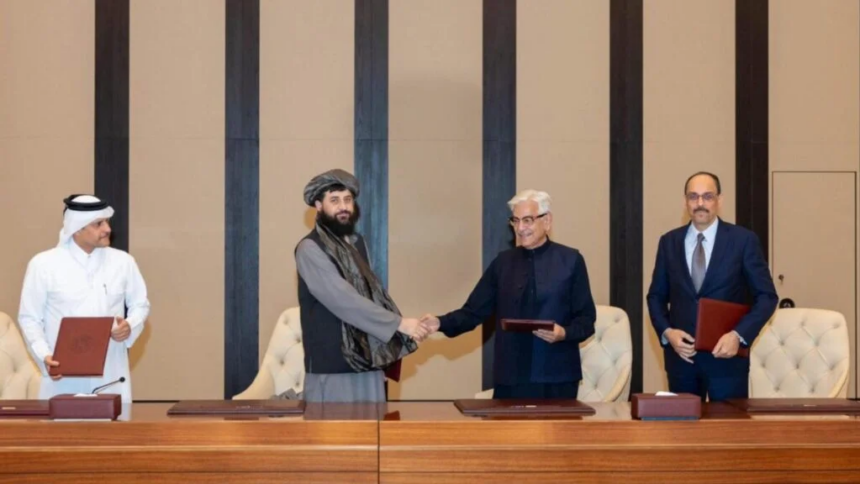RASC News Agency: The second round of so-called security talks between delegations representing Pakistan and the Taliban concluded in Istanbul this week with little to show beyond an agreement to “continue discussions.” The negotiations, mediated by Turkey, were billed as an attempt to strengthen cross-border security and counterterrorism cooperation but according to diplomatic observers, they revealed more about the Taliban’s diminishing regional credibility than about any substantive progress.
Sources familiar with the talks told RASC News Agency that the Istanbul sessions held behind closed doors focused on defining a practical mechanism for security coordination, intelligence sharing, and border stability. Both sides reportedly agreed to extend the dialogue over the coming days in an effort to develop a more “structured framework” for future cooperation. Yet insiders admit that deep mistrust, competing agendas, and the Taliban’s unwillingness to confront extremist factions operating under their protection continue to paralyze any meaningful progress.
Pakistani officials, quoted by the Express Tribune, said their delegation presented explicit proposals to the Taliban aimed at dismantling safe havens belonging to the Tehrik-i-Taliban Pakistan (TTP) and its allied militant factions. Islamabad’s principal demand was unequivocal: the Taliban must stop allowing TTP operatives to use Afghanistani soil as a launchpad for attacks across the border. A senior Pakistani security official was quoted as saying, “Pakistan has made it clear that the so-called authorities in Kabul can no longer remain indifferent. They must either act against the terrorists or bear responsibility for the consequences.”
While Pakistan adopted what it described as a “clear and uncompromising” position, the Taliban’s response was characteristically vague. Their chief spokesperson, Zabihullah Mujahid, released a brief statement claiming that both sides had agreed to uphold a ceasefire and reduce border tensions remarks widely dismissed by analysts as symbolic rhetoric designed to mask the group’s paralysis. Observers note that similar declarations in the past have failed to prevent further escalation, with Taliban border units repeatedly accused of initiating cross-border fire.
Earlier this month, Pakistan’s Defence Minister, Khawaja Asif, cautioned that Islamabad would not hesitate to pursue an “open confrontation” if the Taliban failed to restrain the TTP. Although he acknowledged a temporary lull in border skirmishes, he stressed that Pakistan’s patience was wearing thin, describing the Taliban’s approach as “hesitant, inconsistent, and duplicitous.”
Tensions between the two sides have surged since mid-October, following reports that Taliban border forces opened fire on Pakistani military positions along the Khyber Pakhtunkhwa and Balochistan frontiers. In retaliation, the Pakistani military launched targeted strikes that destroyed several Taliban outposts. Security sources told RASC News Agency that dozens of Taliban fighters were killed in those operations casualties that Taliban-controlled media has sought to obscure through selective reporting.
Analysts argue that the Taliban’s participation in these Istanbul talks is largely performative, intended to reduce diplomatic pressure while maintaining covert ties with militant groups that serve their strategic leverage. “The Taliban are attempting to present themselves as a responsible government,” said a former Afghanistani diplomat now based in Ankara. “But in reality, they continue to shelter extremists who destabilize the entire region. Their diplomacy is a facade built on fear and manipulation.”
Turkey’s mediation reflects Ankara’s growing ambition to position itself as a regional peace broker, yet the prospects for success remain dim. Experts contend that symbolic diplomacy cannot compensate for the Taliban’s absence of legitimacy, governance capacity, or willingness to adhere to international norms.
Once seen as Islamabad’s strategic asset, the Taliban have increasingly become a liability an erratic actor presiding over a state hollowed out by repression, economic collapse, and militant fragmentation. Their failure to establish credible governance has turned Afghanistan into a magnet for transnational extremist networks, threatening not only Pakistan but also the broader stability of Central and South Asia.
As the Istanbul negotiations prepare for another round, expectations are muted. The so-called “Islamic Emirate” continues to rely on force, propaganda, and tactical ambiguity to mask its internal disarray while the people of Afghanistan remain trapped under one of the most repressive regimes of the modern era, and their territory once again risks becoming a sanctuary for regional terror.






